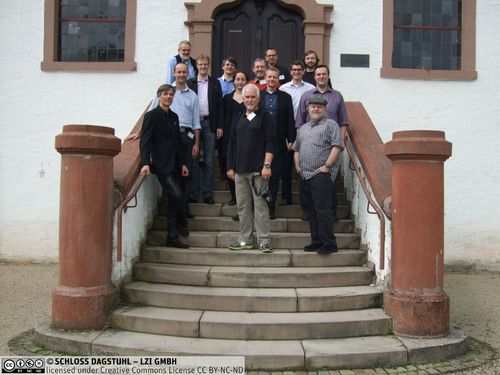Dagstuhl Perspectives Workshop 12182
Social, Supply-Chain, Administrative, Business, Commerce, Political networks: a multi-discipline perspective
( May 01 – May 04, 2012 )
Permalink
Organizers
- Matthias Häsel (Otto Group - Hamburg, DE)
- Thorsten Quandt (Universität Münster, DE)
- Gottfried Vossen (Universität Münster, DE)
Contact
- Annette Beyer (for administrative matters)
Publications
- Social, Supply-Chain, Administrative, Business, Commerce, Political networks: a multi-discipline perspective (Dagstuhl Perspectives Workshop 12182). Mattias Häsel, Thorsten Quandt, and Gottfried Vossen. In Dagstuhl Reports, Volume 2, Issue 5, pp. 26-42, Schloss Dagstuhl - Leibniz-Zentrum für Informatik (2012)
- Social, Supply-Chain, Administrative, Business, Commerce, Political networks: a multi-discipline perspective (Dagstuhl Perspectives Workshop 12182). Matthias Häsel, Thorsten Quandt, and Gottfried Vossen. In Dagstuhl Manifestos, Volume 2, Issue 1, pp. 1-13, Schloss Dagstuhl - Leibniz-Zentrum für Informatik (2012)
Press/News
Press Release
- Wie Netzwerke unsere Welt verändern
Pressemitteilung
Press Reviews
-
Cloud Computing
Download der Computerclub Zwei-Sendung vom 12.11.2012; ab Minute 7. Wolfgang Back und Wolfgang Rudolph im Gespräch mit Prof. Dr. Gottfried Vossen -
Netzwerke
Saarländischer Rundfunk, SR2-Kulturmagazin Länge 7 am 06.05.2012
Stefan Schmidt im Gespräch mit Prof. Dr. Thorsten Quandt - Wie Netzwerke unsere Welt verändern
Download der Computerclub Zwei-Sendung vom 04.06.2012 (32 Kbit/s (~7 MB)); ab Minute 15. Wolfgang Back im Gespräch mit Dr. Matthias Häsel und Prof. Dr. Thorsten Quandt - Wie Netzwerke unsere Welt verändern
Saarbrücker Zeitung am 24.04.2012
The information society is shaped by an increasing presence of networks in various manifestations. Efficient computer networks are regarded as a significant enabler for the process of change towards networks of any size and complexity. They serve as an administrative and technological basis for social network structures, with the result that online networks connect people all around the world at day and night, and allow to communicate and to work collaboratively, efficiently, and without recognizable time delay. Companies reduce their in-house production depth, join forces in supply chain networks and establish cooperation with their suppliers, with their customers, and even with their competitors. By now, social networks like Facebook, Google+, LinkedIn or XING are seen as the de facto standard of ``social networking'' in the information society. Companies are mimicking their effects internally, allow overlays of networking applications with regular business ones, and a use of social networks for enterprise purposes including and beyond advertising has become common. Public administrations create and improve shared services and establish ``Private Public Partnerships (PPP)'' to benefit from synergetic effects of cooperation with private and public organizations.
As the interactions between people in these networks increase at various levels, new approaches are needed to analyze and study networks and their effects in such a way that individuals as well as organizations and enterprises can benefit from them. This Perspectives Workshops has convincingly shown that more interaction and collaboration between fields such as information systems, computer science, social sciences, economics, communication sciences and others is needed. The fields need to identify a common level of language, tools and set of methodologies so that the various aspects of networking can be addressed and jointly developed further. The most important point is the need for a renewed multi-disciplinarity. To a great extent, networks are driven and further developed by practitioners; which also means that they are evolving in a very fast manner and not emanating from a single scientific discipline. To be able to both understand them and contribute to the state of art, true inter- or multi-disciplinary research is needed that involves the fields mentioned. As these distinct disciplines grow together and embark on collaborative research, it is also important to convince funding agencies that multi-disciplinary research should arrive on their agendas. Finally, Web sciences need to be developed as a field, and also need to be integrated into teaching. This will most likely lead to novel curricula which receive their content from multiple disciplines in a balanced way.
- Jörg Becker (Universität Münster, DE) [dblp]
- Daniel Beverungen (Universität Münster, DE) [dblp]
- François Bry (LMU München, DE) [dblp]
- Clemens Cap (Universität Rostock, DE) [dblp]
- Ingo Dahm (Deutsche Telekom - Bonn, DE)
- Stuart Dillon (University of Waikato, NZ) [dblp]
- Emese Domahidi (Universität Hohenheim - Stuttgart, DE)
- Matthias Häsel (Otto Group - Hamburg, DE)
- Bernd Hellingrath (Universität Münster, DE) [dblp]
- James A. Hendler (Rensselaer Polytechnic Institute - Troy, US) [dblp]
- Stefan Klein (Universität Münster, DE) [dblp]
- Nicolas Pflanzl (Universität Münster, DE)
- Thorsten Quandt (Universität Münster, DE) [dblp]
- Michael Räckers (Universität Münster, DE)
- Gottfried Vossen (Universität Münster, DE) [dblp]
Related Seminars
- Dagstuhl Seminar 16141: Analysis, Interpretation and Benefit of User-Generated Data: Computer Science Meets Communication Studies (2016-04-03 - 2016-04-08) (Details)
Classification
- Social Networks
- Supply-Chain Networks
- Administrative Networks
- Business Networks
- Commerce Networks
- Political Networks
Keywords
- Evolving Networks
- Network Society
- Network Drivers
- Network Cohesion
- Network Behavior
- Business Process Integration
- Ubiquitous Computing
- Graph Theory


